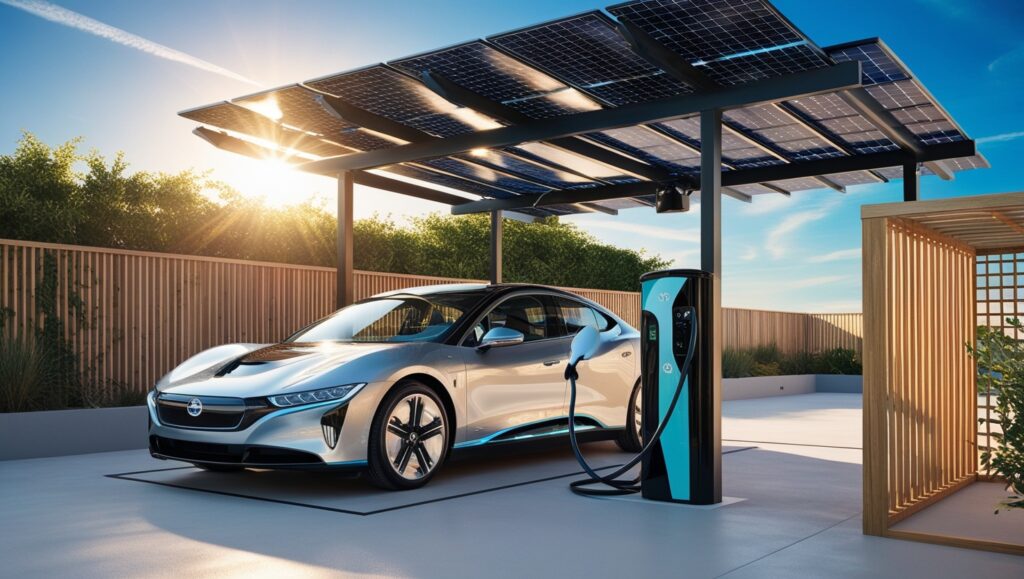
Imagine driving your electric car without ever worrying about fuel costs again. With solar panels, this dream can become a reality. “Free Fuel Forever? Powering Your Electric Car with Solar Panels for Sustainable Transportation” explores how harnessing solar energy can offer a sustainable and cost-effective solution for powering electric vehicles. Solar panels for electric cars provide not only environmental benefits but also significant long-term savings. By combining the clean energy of solar power with the efficiency of electric vehicles, you can enjoy a truly sustainable transportation option that reduces your carbon footprint and saves money on energy costs.
How Solar Panels Can Power Your Electric Car

Solar panels can power your electric car, offering a sustainable and cost-effective energy solution. By installing home solar power for electric vehicles, you can harness the sun’s energy to charge your EV, reducing dependence on grid electricity and lowering your energy bills. But can solar power run an electric car efficiently? Yes, it can. Charging your electric car with home solar panels is not only feasible but also practical for daily use.
The key question is: Is solar power enough to charge an electric car? With the right setup, including adequate solar panel capacity and proper installation, solar power can fully meet your EV charging needs. The cost-effectiveness of solar panels for electric car charging is notable, with initial installation costs offset by long-term savings on fuel and electricity. By investing in solar panels, you create a sustainable energy cycle, reducing your carbon footprint and ensuring free fuel for your electric vehicle for years to come.
Understanding the Benefits of Solar-Powered Electric Car
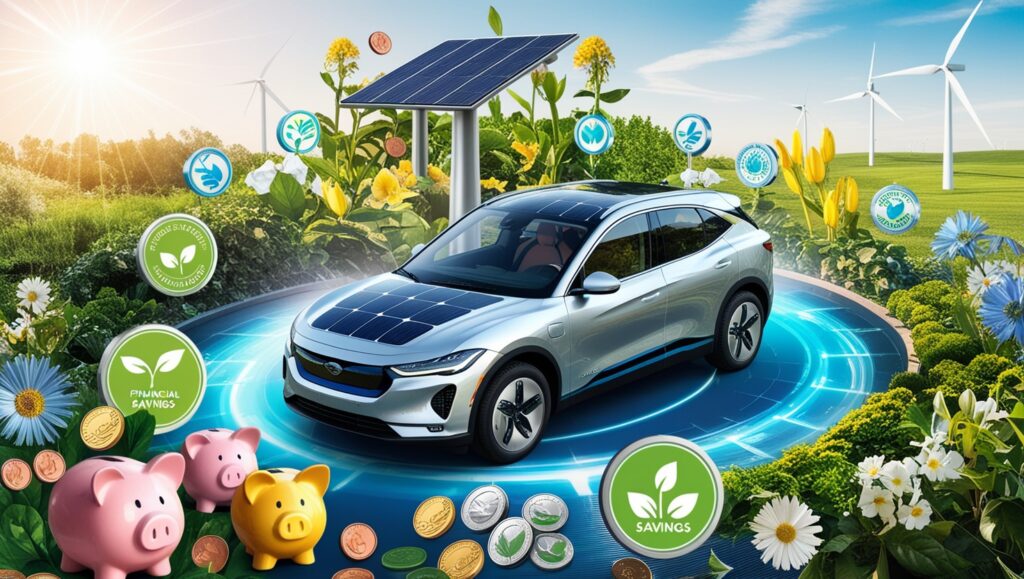
Understanding the benefits of solar-powered electric vehicles reveals a promising future for sustainable transportation. One major advantage is the significant cost savings. By using solar panels for electric cars, you can drastically reduce or even eliminate your fuel expenses. Additionally, solar-powered EVs are environmentally friendly, producing zero emissions and reducing your carbon footprint.
Benefits of solar EVs also include energy independence. With home solar power for electric vehicles, you’re less reliant on the fluctuating prices and availability of grid electricity or fossil fuels. This independence is both financially and strategically advantageous. Furthermore, solar electric car advantages extend to the convenience of charging your vehicle at home. No more trips to the gas station; simply plug in your EV and let the sun do the work.
Incorporating solar panels with electric vehicles enhances the overall sustainability of your lifestyle, making solar-powered electric vehicles a smart choice for the eco-conscious and cost-savvy consumer.
Step-by-Step Guide to Installing Solar Panels for EV Charging
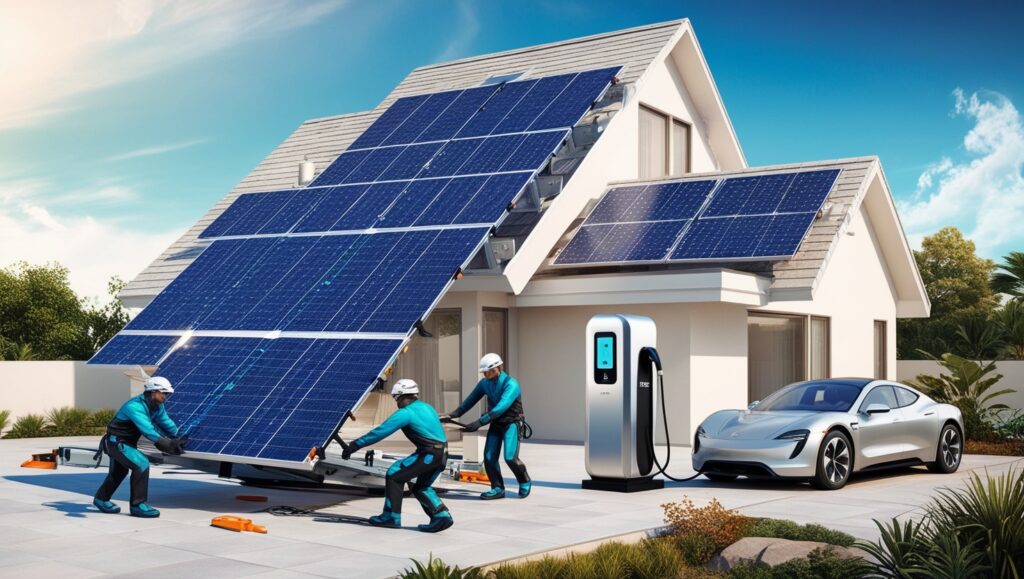
Installing solar panels for EV charging is a great way to achieve energy independence and save money. Follow this step-by-step guide to installing solar panels for electric vehicles:
1. Assess Your Energy Needs: Calculate how much energy your electric vehicle requires daily. Use a solar energy for EV charging calculator to estimate the number of panels needed.
2. Site Evaluation: Ensure your roof has enough space and sunlight exposure for home solar power for electric vehicles.
3. Choose the Right Panels: Select efficient and durable solar panels suited for your location and energy needs.
4. Professional Installation: Hire a certified installer to set up the system safely and efficiently.
5. Connect to Your EV Charger: Integrate the solar panels with your home charging station to start charging your electric car with home solar panels.
With these steps, you’ll maximize the benefits of solar energy for your electric vehicle.
Cost Savings: Solar Panels vs. Traditional Charging Methods

When comparing cost savings: solar panels vs. traditional charging methods, the benefits of solar panels for electric cars become evident. Solar panels cost savings are substantial, as they harness free sunlight to power your electric vehicle, eliminating or drastically reducing electricity bills. Traditional charging methods rely on grid electricity, which fluctuates in price and contributes to ongoing expenses.
Investing in home solar power for electric vehicles involves an initial setup cost, but this is offset by long-term savings. Solar charging vs. grid charging shows that solar panels pay for themselves over time through reduced energy costs. Additionally, with solar power, you gain energy independence, protecting yourself from rising utility rates. Embrace solar energy for EV charging to enjoy significant financial and environmental benefits, making it a wise investment for the future.
How Much Solar Energy is Needed to Charge an Electric Car?
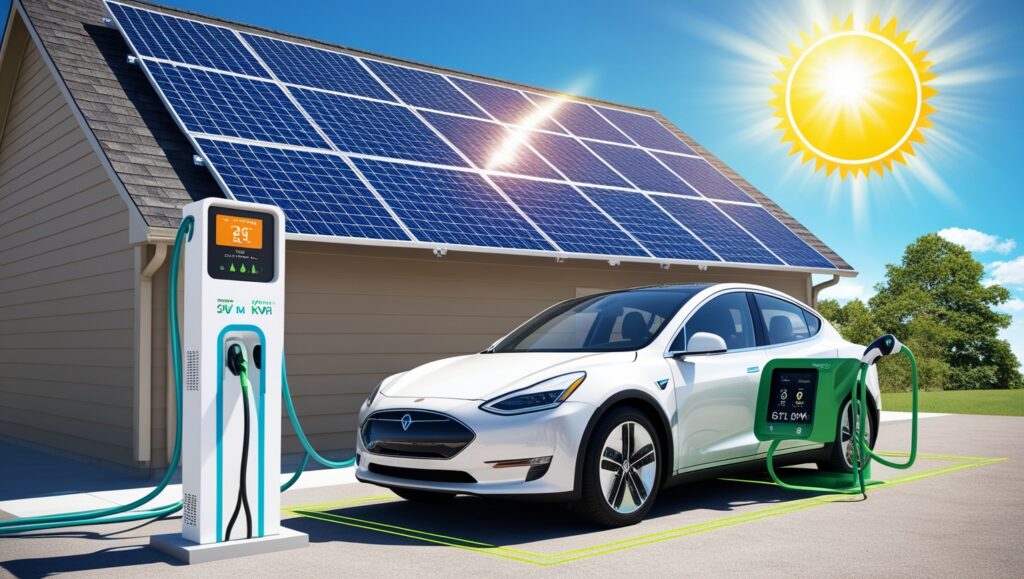
Understanding how much solar energy is needed to charge an electric car is crucial for optimizing your setup. The amount of solar energy for EV charging depends on your vehicle’s battery capacity and your driving habits. On average, an electric car requires about 30 kilowatt-hours (kWh) per 100 miles.
To determine your needs, calculate the daily mileage and corresponding energy consumption. For instance, if you drive 30 miles a day, you’ll need approximately 9 kWh of solar energy daily. With this in mind, you’ll need about 3-4 high-efficiency solar panels to meet these needs, assuming each panel generates around 250-300 watts per hour under optimal conditions.
Using home solar power for electric vehicles is a sustainable way to ensure you have enough energy to keep your electric car running efficiently.
Maximizing Efficiency: Tips for Using Solar Panels with Electric Car
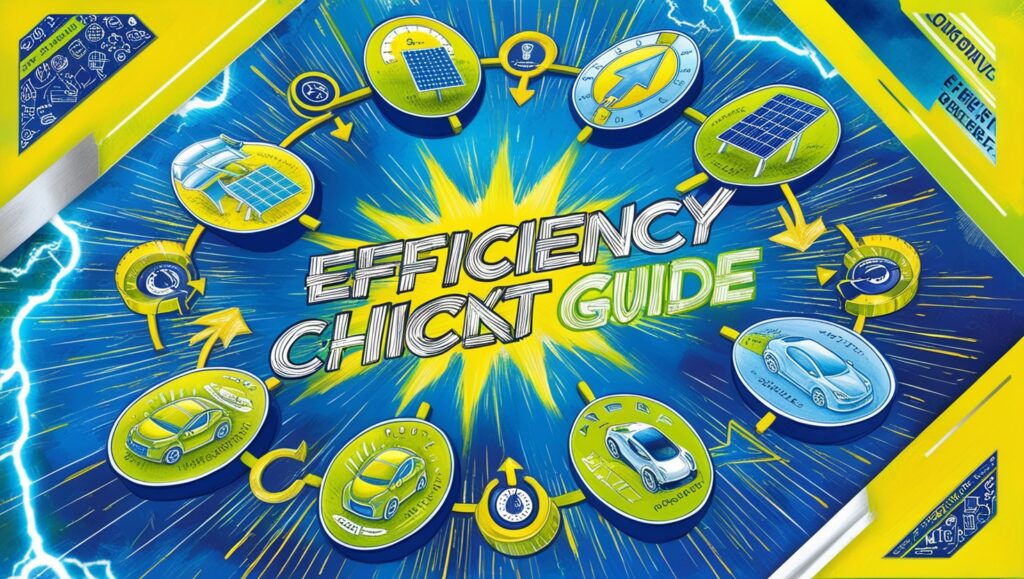
Maximizing efficiency with solar panels for electric vehicles ensures you get the most out of your investment. Here are some tips to help you achieve this:
1. Optimize Panel Placement: Install your solar panels in a location with maximum sun exposure to increase energy generation.
2. Use Efficient Charging Times: Charge your electric vehicle during peak sunlight hours to harness the most energy.
3. Monitor Your System: Regularly check your solar system’s performance to ensure it’s working efficiently.
4. Maintain Your Panels: Keep your solar panels clean and free from obstructions to maintain high energy output.
5. Upgrade to Smart Chargers: Use smart EV chargers that can adapt to the energy output of your home solar power for electric vehicles.
By following these tips, you can maximize the benefits and efficiency of your solar-powered electric vehicle setup.
Real-Life Examples of Solar-Powered Electric Vehicles
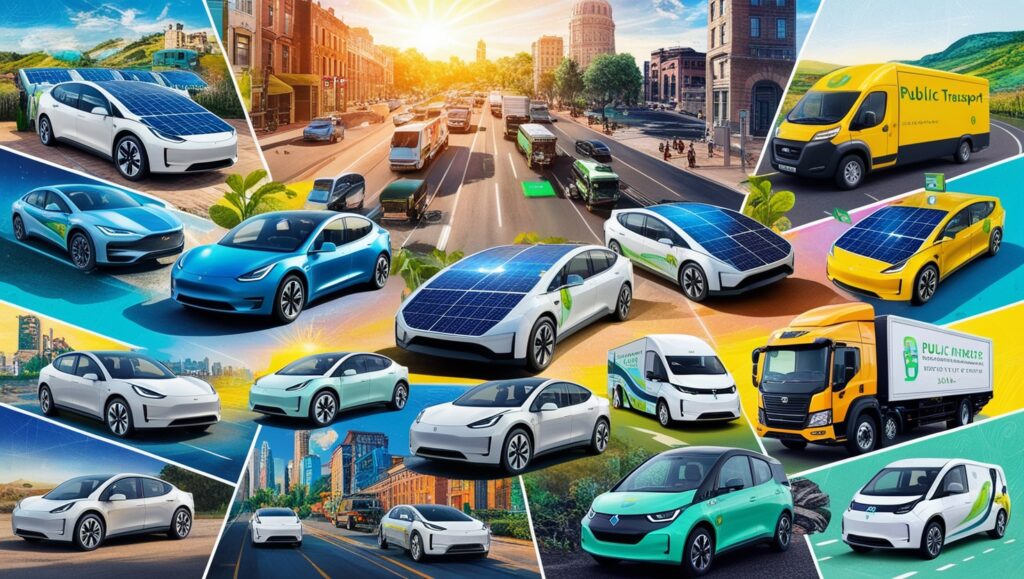
Real-life examples of solar-powered electric vehicles demonstrate the practicality and benefits of harnessing solar energy for EV charging. For instance, some enthusiasts have customized their vehicles with rooftop solar panels, allowing them to charge while parked or on the go. These solar electric vehicle setups showcase innovation in sustainable transportation, reducing reliance on traditional fuel sources and lowering carbon emissions.
One notable example is the Solar Impulse, a solar-powered airplane that completed a round-the-world flight solely using solar energy. Closer to home, individuals and businesses alike are integrating solar panels for electric cars into everyday use, demonstrating the feasibility and efficiency of home solar power for electric vehicles. These examples highlight the growing trend towards cleaner and more energy-efficient transportation solutions.
Conclusion
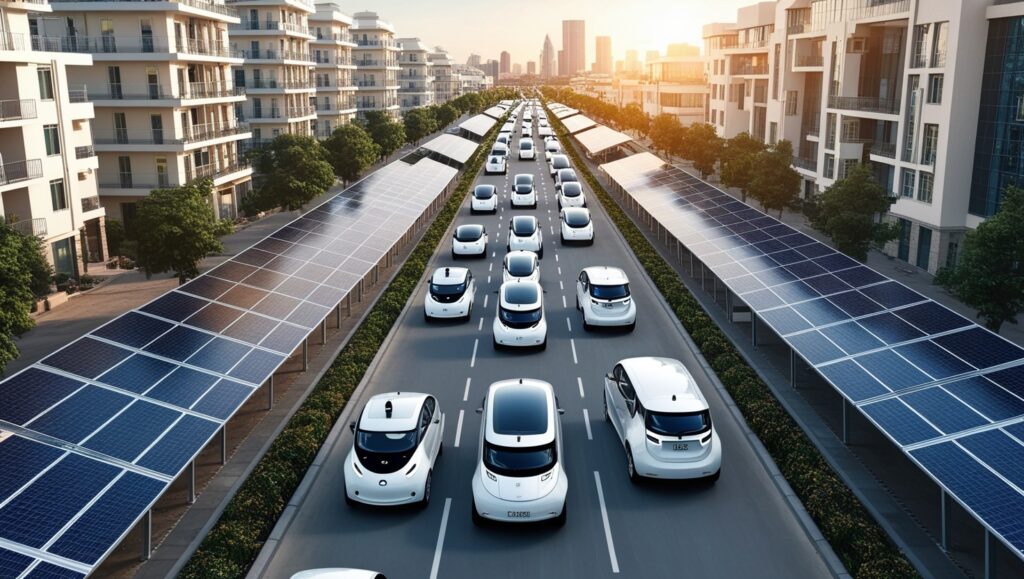
In conclusion, the rise of solar-powered electric vehicles represents a transformative shift towards sustainable transportation. These innovative solutions not only reduce carbon footprints but also offer significant cost savings and energy independence. Imagine a future where your vehicle charges silently under the sun, without ever stopping at a gas station. From pioneering solar-powered airplanes to everyday commuters embracing solar panels for electric cars, the potential for clean, renewable energy in transportation is limitless.
Whether you’re passionate about environmental stewardship, curious about cutting-edge technology, or simply looking to save money on fuel, solar-powered electric vehicles offer something for everyone. Embrace the power of the sun and join the movement towards a greener, more sustainable future on the road. Discover more about the benefits, challenges, and exciting advancements in solar energy for EV charging—your journey to cleaner, smarter transportation starts here.
Thank you for the good writeup It in fact was a amusement account it Look advanced to far added agreeable from you However how could we communicate